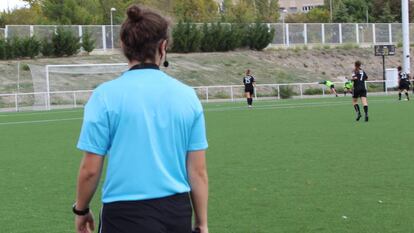Spanish soccer fans to female referee: “Go wash the dishes!”
Eighteen-year-old Alexandra García was subjected to 90 minutes of sexist insults as she oversaw a junior game in San Lorenzo de El Escorial

Last Sunday, Alexandra García stood out in the rain to referee at a junior soccer match at a field in La Herrería, in San Lorenzo de El Escorial, 50 kilometers northwest of Madrid. The game was played between the local team from San Lorenzo de El Escorial and a club from Collado Villalba.
In the stands, the soccer players’ parents hurled abuse at Alexandra. “Retard!” they shouted. “You piece of shit!” “You’re an asshole!” ”Go home, bitch!” “Go wash the dishes, bitch!” All García heard was noise.
I was filled with rage and dismay; nobody did or said anything
Referee’s mother Mercedes Nuño
“I had my head in the game. I was concentrating. The players were talking to me,” she explains to EL PAÍS via phone. “I realized in the first 20 minutes that something was happening in the stands, but I didn’t know what they were saying. If I did, it would definitely have affected me.”
Someone who could hear the insults “perfectly” was Alexandra’s mother, Mercedes Nuño, the sports councilor at Galapagar local council, from the center-right party Ciudadanos (Citizens). After the game, she took to Twitter to share what had happened. “I was filled with rage and dismay; nobody did or said anything. I spent 90 minutes listening to my daughter being insulted; it was a total lack of respect, which is intolerable,” she says.
When Nuño asked those who were shouting to stop, explaining that she was the referee’s mother, the insults only got worse. According to Nuño, they told her that “if I didn’t like what I was hearing, I should leave.” She says the only thing that made her feel better was seeing that her daughter was oblivious to the insults. “She was focused on the match, not paying attention,” says Nuño.
Hasta le han dicho "que zorra eres, puta" y nadie se ha dignado a condenar un mínimo, simplemente le ha parecido EXAGERADO a una mujer.
— Merche (@MasipNuno) November 17, 2019
Todo se ha permitido. Una grada con padres, madres, abuelos, niños... Nuestra obligación es respetar y hacer respetar, valores del deporte.
They even said “what a whore you are, bitch” and nobody deigned to make the smallest criticism. It simply seemed to them that a woman was exaggerating. Everyone allowed it. A stand with fathers, mothers, grandparents, children ... Our obligation to respect and make others respect, sporting values.
García admits that had she realized what was being said, she would have felt worse for her mother than for herself. “I know what she’s like,” she says. “I know how much she hates these things in matches… I would have felt awful for her.”
When the game finished, some members of the visiting team approached García to say she shouldn’t give it another thought and that she had done well. But García believes these players didn’t realize any more than she did exactly what was being shouted. “I think they only said that because, like me, they saw that the public was acting up from the start, not because they had heard the horrible things they were saying,” she explains. When the game was over, García’s mother played her the recording of the insults. García was shocked.
“Sometimes members of the public don’t agree with your decision but neither this year, nor last did I hear these kinds of insults, which are clearly sexist. Nobody shouts, ‘Go wash up!’ to a male referee. But they do to us,” says García.
Last year, in the run-up to the International Day for the Elimination of Violence Against Women on November 25, Spanish female referees got together to take a stand against sexism in soccer. With the support of the Royal Spanish Soccer Federation (RFEF) and the collaboration of the Technical Referee Committee, they launched a video that showed the insults they are regularly subjected to during matches. The video finishes with a group of female referees who blow their whistles as though to mark the end of a game, and hold up a banner that reads: “You decide the end.”
Campaign to stop sexism against female soccer referees (Spanish audio).
“It would be great if this kind of thing didn’t go viral,” says García. “And that there was no news like this because it just wasn’t happening. But it happens day in and day out. I shouldn’t have to worry about being insulted.”
When women come into the equation, the verbal violence typical of soccer takes on a sexist edge. After Nuño posted her Twitter messages, the local team, the council and Madrid’s Royal Soccer Federation (RFFM) all spoke out against the incident. “The visiting team’s coach sent me encouragement through my mother and told me he was sorry about what had happened,” says García.
San Lorenzo de El Escorial council announced that it was going to ask the club to take the necessary measures to prevent anything similar from happening again, and pointed out that next Monday is the International Day for the Elimination of Violence Against Women, a violence that, it stated, “has to be eliminated from all areas and obviously from sport.”
Nobody shouts: ‘Go wash up!’ to a male referee. But they do to us
Referee Alexandra García
The RFFM declared that it was going to draw up a proposal to encourage the relevant federated entities to “take a harder line with those who don’t know how to live in a society in which education, respect and fair play should prevail.”
Ideally, female referees will no longer have to be accompanied after a game to the changing rooms. “That happens, as a precautionary measure,” says García, who has began refereeing last year when she was 17. In the referee course she took in June, 2018, there were only two other women. “There are still many more boys than girls,” she says. “But it’s starting to change. I have never felt discriminated against, neither acting as referee or playing soccer.”
García has been playing soccer since she was eight when she lived in Zaragoza in Spain’s northeastern Aragón region. She started with indoor soccer, then joined a seven-a-side team when she moved to the Madrid region with her family, before moving onto the 11-a-side senior A team, which was the first female team in Torrelodones.
García is currently studying to join the National Police. In the meantime, she and the other female referees have a new project in the pipeline. “It’s to check in with each other and assess how things went at the weekend,” she says.
She hopes that there won’t be any repeat of Sunday’s incident, and for gender discrimination to be tackled in all areas. “Everyone should be invited to act as referee or play if they want to,” she says. “Any woman should really be able to do what they want and be free to choose.”
Would she describe herself as a feminist? “Of course,” she says. “I believe in equality.”
English version by Heather Galloway.
Tu suscripción se está usando en otro dispositivo
¿Quieres añadir otro usuario a tu suscripción?
Si continúas leyendo en este dispositivo, no se podrá leer en el otro.
FlechaTu suscripción se está usando en otro dispositivo y solo puedes acceder a EL PAÍS desde un dispositivo a la vez.
Si quieres compartir tu cuenta, cambia tu suscripción a la modalidad Premium, así podrás añadir otro usuario. Cada uno accederá con su propia cuenta de email, lo que os permitirá personalizar vuestra experiencia en EL PAÍS.
¿Tienes una suscripción de empresa? Accede aquí para contratar más cuentas.
En el caso de no saber quién está usando tu cuenta, te recomendamos cambiar tu contraseña aquí.
Si decides continuar compartiendo tu cuenta, este mensaje se mostrará en tu dispositivo y en el de la otra persona que está usando tu cuenta de forma indefinida, afectando a tu experiencia de lectura. Puedes consultar aquí los términos y condiciones de la suscripción digital.









































